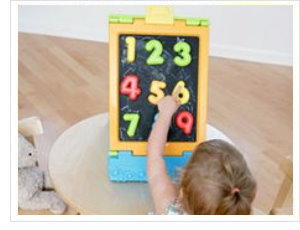The top 8 myths of Early Math


Myth 5: Teaching a baby math is putting too much pressure on her at such a young age.
Some people, when they hear that a baby is being taught mathematics, imagine the baby being subjected to the kind of math lessons they were subjected to in school. In fact, nothing could be farther from the truth: besides the fact that it would be developmentally inappropriate to give a baby the kind of mathematics lessons given in school, it would also be impossible to teach a baby math that way.
The way to teach a baby math is to make it fun, to make a game, and to do it often. Done that way, math lessons are something the baby looks forward to in the same way that he looks forward to his other favorite games. Once the child is old enough, he will start asking for – or even demanding – his math lessons.
As long as you teach math in a fun way, your child will want more. Of course, it’s quite right for parents to be wary about whether their baby will enjoy learning math – no parent wants to risk putting their child off such an important subject.
By following the golden rule of teaching babies, you can effectively ensure that this never happens. The golden rule is:
Only teach your baby when your baby wants to learn.
If your baby is not completely happy either before or during a math lesson, then stop at once. If that means you don’t do a lesson at all that day, then fine. The goal here is not to teach your child certain skills within a certain timeframe. Instead, your main aims should be:
- To provide your child with mental stimulation.
- To give your child the opportunity to learn math at the time when it is easiest (bearing in mind that many children can only perceive large quantities up to the age of two and a half).
- To bond with your child and have fun learning math.
Our society considers mathematics a subject that you are either born to be good at or not. Some people spend their lives feeling at home with numbers and numerical concepts; the majority of us do not.
But what if everyone could feel at home with numbers, simply by seeing quantities and equations from a young enough age? Sure, we wouldn’t all turn into world-class physicists, but mathematics could at least feel like second nature to the majority us.
For many graduates of successful Glenn Doman math programs, dealing in numbers is indeed second nature. Such people find it impossible to grasp why mathematics remains such an intimidating subject to so many people.
Besides presenting a window of opportunity for teaching quantity, the first few years of life are the easiest time to begin math on an emotional level, too. Children at school are bombarded with distractions. As a child builds her social networks, and develops friendships and hobbies, it may be natural for schoolwork to become one of her lowest priorities. Teaching your child mathematics in early childhood can ease the transition to elementary school, where she will otherwise have to deal with learning math on top of a host of other challenges.
On to myth number 6…